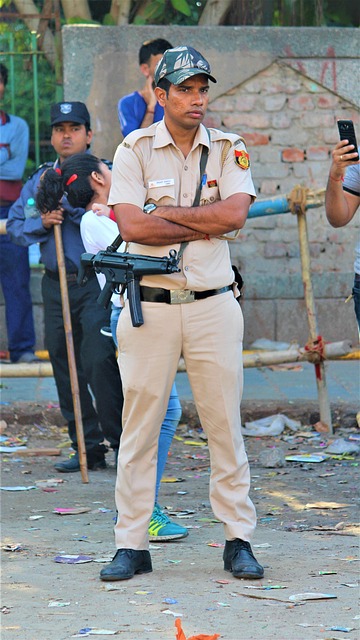High-level diplomatic security is paramount for protecting visiting diplomats and officials from threats like unauthorized access, assassination attempts, and espionage. This involves meticulously vetted venues with advanced surveillance, strict access control, and thorough background checks. Venue vetting, accommodation selection, and comprehensive security assessments are crucial components, ensuring compliance with protocols and maintaining the integrity of international relations through secure environments facilitating productive negotiations and cultural exchanges. Specialized measures tailored to each event's needs, including biometric access control and encrypted communication, integrate physical safety and information protection for robust security.
In the realm of international diplomacy, ensuring secure accommodations and venue vetting is paramount for successful engagements. This comprehensive guide delves into the critical aspects of high-level diplomatic security requirements, emphasizing the vital role of thorough venue evaluations in facilitating meaningful interactions. From identifying key security factors to implementing robust protocols, this article offers best practices for hosting diplomats with unparalleled safety and compliance. Discover how these strategies ensure protective measures without compromising the essence of diplomatic events.
Understanding High-Level Diplomatic Security Requirements
Diplomatic engagements require a deep understanding and adherence to high-level diplomatic security requirements. These secure accommodations and venues must be meticulously vetted to ensure the safety and protection of visiting diplomats, government officials, and their accompanying delegations. The primary focus is on preventing any potential threats, such as unauthorized access, assassination attempts, or espionage activities.
High-level diplomatic security involves robust physical security measures, including advanced surveillance systems, secure entry points with strict access control, and discreet but thorough background checks for all individuals granted access. Additionally, these venues must be equipped to handle sensitive communications, ensuring the confidentiality of discussions through secure networking infrastructure.
The Role of Venue Vetting in Accommodating Diplomatic Engagements
Venue vetting plays a pivotal role in ensuring secure accommodations for high-level diplomatic engagements. It involves a thorough assessment of potential venues to mitigate risks associated with sensitive meetings and events. Vetting processes include verifying the physical security measures, emergency protocols, and background checks on staff to ensure they meet stringent diplomatic security standards. By meticulously scrutinizing these aspects, organizers can create an environment that fosters productive discussions while safeguarding against potential threats.
This meticulous process is crucial for maintaining the integrity of diplomatic relations. A secure venue not only protects high-ranking officials and their delegations but also enhances the overall effectiveness of negotiations and cultural exchanges. Effective vetting ensures that every detail is considered, from access control systems to discreet communication channels, fostering a climate of trust and cooperation essential for successful diplomatic engagements.
Key Factors to Consider When Securing Accommodations for Diplomats
When securing accommodations for diplomats, several critical factors come into play, especially in ensuring high-level diplomatic security. The safety and comfort of the diplomat and their team are paramount, making it essential to thoroughly vet both the physical location and the surrounding area. This includes assessing potential security risks like nearby crime rates, political stability, and access control measures within the venue.
Accommodation arrangements should provide adequate space for official meetings, private rest and recreation, and secure storage of sensitive materials. The venue’s infrastructure, such as backup power, reliable internet connectivity, and modern security systems, must meet stringent diplomatic standards. Additionally, understanding local laws, regulations, and cultural norms related to privacy and hospitality is crucial to facilitating a seamless and secure stay for the diplomats.
Best Practices for Evaluating Venue Safety and Compliance
When evaluating potential venues for high-level diplomatic engagements, a comprehensive approach is essential to ensure both safety and compliance with stringent security protocols. Start by thoroughly reviewing the venue’s historical data and seeking references from previous hosting organizations. This initial step provides insights into their experience handling similar events and their commitment to security measures.
Next, conduct an on-site assessment, focusing on access control, surveillance systems, and emergency response plans. Up-to-date safety certifications and regular training of staff are pivotal. Verify the presence of secure communication networks and redundancy protocols for uninterrupted operations during critical meetings or negotiations. Additionally, ensure the venue adheres to international standards and local regulations, especially in areas like fire safety, waste management, and environmental sustainability, which can impact overall event security.
Implementing Comprehensive Security Protocols for Successful Diplomatic Events
When hosting or attending high-level diplomatic engagements, implementing robust and comprehensive security protocols is paramount to ensure the safety of all involved. This involves a meticulous process of vetting venues, assessing risks, and deploying specialized security measures tailored to the event’s unique demands. Every aspect, from access control and surveillance to emergency response planning, must be carefully orchestrated to create a secure environment.
Comprehensive security for diplomatic events encompasses not just physical safety but also protecting sensitive information and intellectual property. This requires advanced technology such as biometric access control, discreet surveillance systems, and encrypted communication channels. By integrating these measures, organizers can mitigate potential threats, ensuring a seamless and secure experience for all participants, and fostering an atmosphere conducive to productive diplomacy.
Ensuring secure accommodations and meticulous venue vetting are paramount for successful diplomatic engagements. By understanding the intricate high-level diplomatic security requirements, implementing robust best practices, and adopting comprehensive safety protocols, diplomatic events can navigate potential risks effectively. This approach not only fosters a safe environment but also strengthens the overall effectiveness of these crucial interactions.
